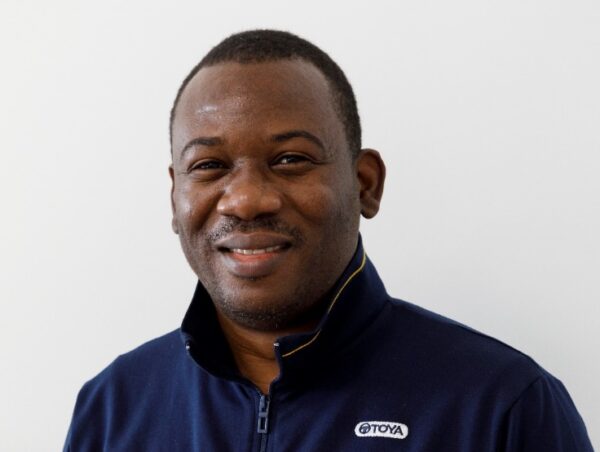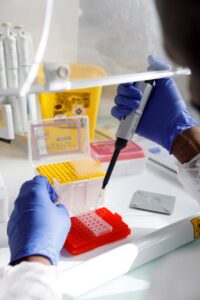Sequencing training: meeting with Ibrehima Guindo
Sequencing training: meeting with Ibrehima Guindo
For three weeks, six scientists from Senegal, Mali and Burkina Faso were hosted by ANRS | | Maladies infectieuses émergentes for training at the genomic platform of the Henri Mondor University Hospital (AP-HP).
We met with one of them, Ibrehima Guindo, a pharmacist biologist and head of the laboratory department of the National Institute of Public Health (INSP) in Bamako (Mali).

How is the surveillance of variants conducted in Mali?
The surveillance of variants is carried out in a timid manner because laboratory tests for the detection of variants are not yet available for routine use. The country relies on national capacities, through research laboratories with technical capacities, but also on WHO collaborating centers in the West African sub-region and in the world. This allows us to have samples sequenced, but very often not representative of the epidemiological situation in real time.
What is the role of the INSP laboratory in this surveillance?
The INSP is the structure that coordinates the response to public health events of national and international scope. It plays a central role in the management of epidemics.
It coordinates the group of diagnostic laboratories for each disease with epidemic potential in the country, and its role is to determine the capacities in terms of sampling, testing and transmission of results. To this end, he coordinates the training of health district and hospital agents in the collection, packaging and transport of samples to sites with diagnostic capabilities. It also trains the agents of these sites. Finally, within the framework of epidemiological surveillance, it coordinates the supply of materials, equipment, reagents and consumables to these sites.

What was the purpose of this training and what did you gain from it?
The purpose of this training was to acquire practical sequencing capabilities, including Next Generation Sequencing techniques.
This will bring more expertise in the country in the laboratory field in general, but particularly in the field of molecular surveillance.
In the short term, this will allow us to train other agents from our respective laboratories and thus be able to offer advanced molecular diagnosis in the context of epidemiological surveillance.
This was an excellent training and all the objectives have been achieved.
The practice in real time and the excellent coaching we received allowed us to get used to the tools and to work on samples brought from our respective countries.
How does the AFROSCREEN project fit into the sequencing strategy in Mali?
The project will strengthen the existing system.
The strengthening of sequencing capacities, the acquisition of NGS (MiniSeq) and complementary equipment, the supply of sequencing reagents and consumables, and the activities implemented within the framework of AFROSCREEN will increase the level of laboratory service offered in the context of surveillance.
Welcoming, follow-up and support of Dr. Guindo and his Burkinabe, Malian and Senegalese colleagues throughout the training provided by the genomic platform of the Henri Mondor University Hospital were ensured by Science Accueil, a partner of ANRS | Maladies infectieuses émergentes.
Find out more:
Sequencing training organized in February 2022
How is the surveillance of variants conducted in Mali?
The surveillance of variants is carried out in a timid manner because laboratory tests for the detection of variants are not yet available for routine use. The country relies on national capacities, through research laboratories with technical capacities, but also on WHO collaborating centers in the West African sub-region and in the world. This allows us to have samples sequenced, but very often not representative of the epidemiological situation in real time.
What is the role of the INSP laboratory in this surveillance?
The INSP is the structure that coordinates the response to public health events of national and international scope. It plays a central role in the management of epidemics.
It coordinates the group of diagnostic laboratories for each disease with epidemic potential in the country, and its role is to determine the capacities in terms of sampling, testing and transmission of results. To this end, he coordinates the training of health district and hospital agents in the collection, packaging and transport of samples to sites with diagnostic capabilities. It also trains the agents of these sites. Finally, within the framework of epidemiological surveillance, it coordinates the supply of materials, equipment, reagents and consumables to these sites.

What was the purpose of this training and what did you gain from it?
The purpose of this training was to acquire practical sequencing capabilities, including Next Generation Sequencing techniques.
This will bring more expertise in the country in the laboratory field in general, but particularly in the field of molecular surveillance.
In the short term, this will allow us to train other agents from our respective laboratories and thus be able to offer advanced molecular diagnosis in the context of epidemiological surveillance.
This was an excellent training and all the objectives have been achieved.
The practice in real time and the excellent coaching we received allowed us to get used to the tools and to work on samples brought from our respective countries.
How does the AFROSCREEN project fit into the sequencing strategy in Mali?
The project will strengthen the existing system.
The strengthening of sequencing capacities, the acquisition of NGS (MiniSeq) and complementary equipment, the supply of sequencing reagents and consumables, and the activities implemented within the framework of AFROSCREEN will increase the level of laboratory service offered in the context of surveillance.
Welcoming, follow-up and support of Dr. Guindo and his Burkinabe, Malian and Senegalese colleagues throughout the training provided by the genomic platform of the Henri Mondor University Hospital were ensured by Science Accueil, a partner of ANRS | Maladies infectieuses émergentes.
Find out more:
Sequencing training organized in February 2022